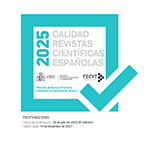Fuentes mudas (en la web): periodismo transitpropaganda
Abstract
Informants constitute a fundamental resource in journalism. The reporter has largely relied on them, either to seek for specific information or to verify data or both. With the emergence of the Internet in the last decades, question-making is no longer the essential tool in the exchange between the journalist and the specific resources. Through the websites, we have gained access to more powerful sources of information. These sources, however, are biased to a great extent and provide conditioned, partial views, just as informants do. No doubt, the most dominant websites have imposed a new style in journalism-making, a ¨dumb journalism¨ which involves a one-way connection: no questions are asked while the right answers are still to be found. Journalism, in this way, seems to reduce dramatically to the bare minimum of becoming mere propaganda and advertising of the most powerful sites in the Web.Downloads
Article download
License
In order to support the global exchange of knowledge, the journal Estudios sobre el Mensaje Periodístico is allowing unrestricted access to its content as from its publication in this electronic edition, and as such it is an open-access journal. The originals published in this journal are the property of the Complutense University of Madrid and any reproduction thereof in full or in part must cite the source. All content is distributed under a Creative Commons Attribution 4.0 use and distribution licence (CC BY 4.0). This circumstance must be expressly stated in these terms where necessary. You can view the summary and the complete legal text of the licence.










